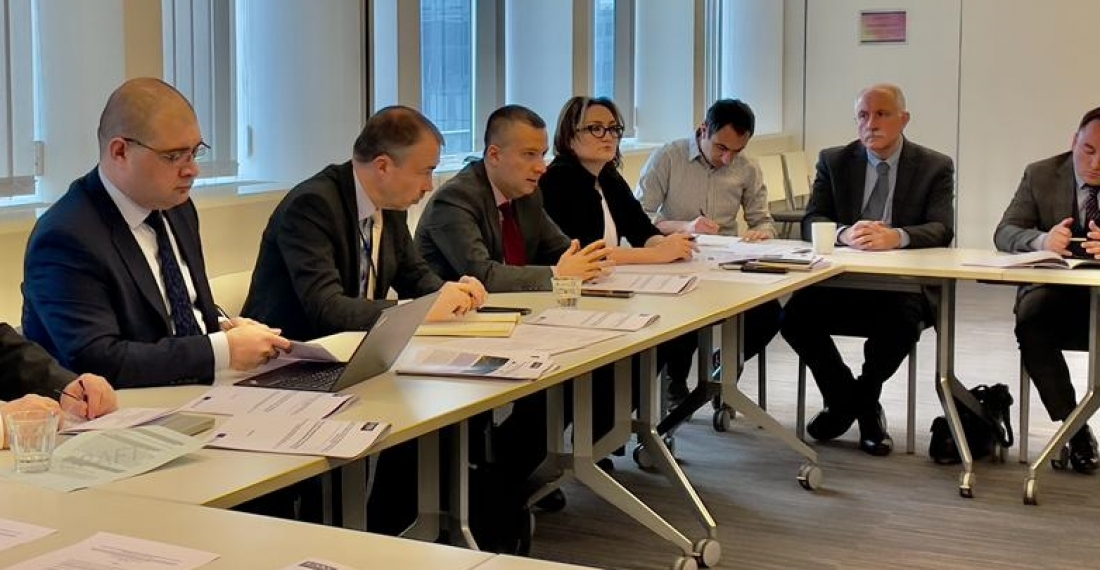The Joint Armenian-Azerbaijani Liaison Group on confidence-building measures in support of lasting peace in the South Caucasus has published its report in which it proposes 30 short, medium and long term measures in support of ongoing efforts to establish peace in the region. In their report, "The South Caucasus from war to peace: 30 measures between now and 2030" the members of the Liaison Group say that Armenia and Azerbaijan, and Armenians and Azerbaijanis, need to build the future based on mutual trust and confidence.
You can read the report in full here
A Russian version of this report is also available here
In their report, published on the eve of the meeting between the leaders of Armenia and Azerbaijan and the president of the European Union in Brussels on 6 April, the group says that "all the ingredients for peace exist in the South Caucasus. All the ingredients for war exist too. What is in front of us is a choice". The group says that the proposed measures are a building block in the quest for peace but if the ideas being proposed are implemented the objective of building a peaceful, secure and prosperous South Caucasus will be much closer to being achieved.
On Wednesday, 6 April, members of the Working Group, presented their report to the EU Special Representative for the South Caucasus, Toivo Klaar, and other EU officials at a special briefing in Brussels.
The thirty measures being proposed are grouped in five categories: (a) in the field of diplomacy, politics, policy, security and geo-politics; (b) in the border areas and within the communities directly affected by the conflict and through broader people to people contacts; (c) in the field of connectivity and economic activity; (d) in education and work with young people; and (e) in public spaces such as media, social media and public platforms, and on heritage, humanitarian and human rights issues.
The members of the Joint Liaison Group are: Ahmad Alili, Mehman Aliyev, Stepan Grigoryan, Shahla Ismayil, Samir Mammadov, Johny Melikyan, Benyamin Poghosyan, Ramazan Samadov and Anar Valiyev. The group has been preparing its report for the last six months, during which it held several meetings and consulted with a wide range of stakeholders. This followed a period of six months of preparation with meetings held with stakeholders in Armenia, Azerbaijan and Georgia between March and September 2021. The work of the Joint Liaison Group was co-ordinated and facilitated by LINKS Europe - an independent foundation based in The Hague, The Netherlands - in the framework of the European Union's EU4Peace initiative.
A spokesperson for LINKS Europe said that the fact that the report has been prepared and agreed by a joint group of Armenian and Azerbaijani experts is significant. The timing of the report, coinciding with the meeting in Brussels on 6 April of the leaders of Armenia and Azerbaijan with the president of the European Union, and the launch of a process to negotiate a peace treaty between the two countries, is very appropriate. It was now necessary that all concerned should put effort into turning the thirty measures being proposed in the report into tangible action.
Background information
The Joint Armenian-Azerbaijani Liaison group on Confidence-Building Measures in support of lasting peace in the South Caucasus (JOLIG) was constituted after a series of consultation meetings in Yerevan, Baku and Kachreti (Georgia) in 2021, with the specific objective of looking at the role of confidence-building measures in the current situation in the South Caucasus, and propose a number of concrete measures that can be implemented in the short, medium and long term.
read more: Armenian and Azerbaijani experts discuss confidence-building measures
From October 2021 to 31 March 2022 members of the liaison group have met each other in numerous formats, and have also consulted widely with stakeholders in their respective countries and societies and beyond. These conversations helped inform the work of the group, and particularly the conceptualisation and elaboration of the 30 specific actions being proposed.
This report focuses on relations between Armenia and Azerbaijan, and between Armenians and Azerbaijanis, but the scope of the report is many respects regional, i.e. it envisages arrangements that often include also Georgia. In this regard the group held formal and informal meetings with Georgian officials and non-governmental stakeholders to discuss their work.
read more: Experts discuss South Caucasus regional co-operation
The work of the Joint Liaison Group took place in the framework of the EU4Peace project and the broader European Union engagement with the process of building peace and prosperity in the South Caucasus. The support of the European Union for the work of the group was instrumental in enabling it to conduct and finish its work. In December 2021 the Group addressed the President of the European Council, Charles Michel, on the eve of the Eastern Partnership Summit in Brussels with tangible proposals on how the ongoing peace efforts can be supported.
Over the last six months, members of the liaison group from Armenia and Azerbaijan have published joint opinion papers on various aspects of the process for peace in the South Caucasus
Benyamin Poghosyan and Anar Valiyev "In the South Caucasus, one year after a costly war, a glimmer of hope for peace"
Ramazan Samadov and Johnny Melikian "Armenia-Azerbaijan connectivity is crucial for the future of the South Caucasus, and important also for partners beyond"
Ahmad Alili and Stepan Grigoryan "The people of the South Caucasus deserve a better and more peaceful future"






